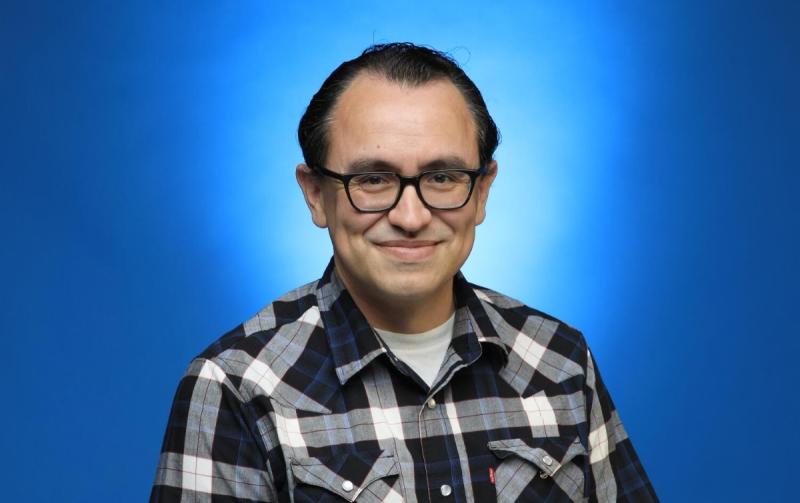“Food, Culture & Journalism” with Gustavo Arellano of the Los Angeles Times

Gustavo Arellano. Courtesy photo.
Join us for a conversation with one of the most interesting and insightful voices in food journalism at this year’s Margolin lecture. Gustavo Arellano, 2025 Pulitzer Prize finalist, 2023 Pulitzer Prize winner and celebrated Los Angeles Times columnist, brings his unique perspective on Mexican cuisine, Latino communities and the power of storytelling through food.
From his nationally syndicated "Ask a Mexican!" column to his acclaimed food writing, Arellano has never shied away from controversy or complexity. What sets Arellano apart is his commitment to truth over comfort. He embraces culinary controversies, defending non-Mexicans cooking Mexican food and admitting not all Mexican cuisine is delicious. His approach cuts through stereotypes with nuanced storytelling that reveals food as "political, personal, economic and history — literally LYFE."
As a longtime investigative reporter and editor at OC Weekly before joining the Los Angeles Times, Arellano has covered everything from corruption to wildfires, always seeking "stories no one else is reporting, or angles no one else has." His mission is simple: "I don't like evil, so anything I can do to take it down or warn people about it, I'm for!"
Attendees can expect exclusive insights into Colorado's Mexican food scene. Do not miss this opportunity to learn from a journalist who transforms the simple act of eating into powerful cultural commentary.
The event is presented in connection with the Spanish Language Media Production Micro-credential. Opening remarks will be provided by Julia Roncoroni, associate professor in the Morgridge College of Education and head of the Health Disparities Research Lab, who will share insights from her forthcoming cookbook. Additional remarks will come from Lina Reznicek-Parrado, associate teaching professor and director of the Spanish Program for Heritage/Bilingual Speakers, and Carlos Jimenez Jr., associate professor in Media, Film and Journalism Studies. Reznicek-Parrado and Jimenez co-direct the Spanish Language Media Production program.
The Margolin Lecture will be held Thursday, September 18, 2025, 10-11:45 a.m., in Anderson Academic Commons, Room 290 (2150 E Evans Ave., Denver) with refreshments to follow. Students, faculty, staff and community members can register for the event here.
Read the full interview with Gustavo Arellano below.
Q&A with Gustavo Arellano
What are you most passionate about covering and why?
"All of it. Food. Corruption. Politics. Investigations. Sports. Music. Latinos," said Arellano. His focus is on stories no one else is reporting or angles no one else has. "I also don't like evil, so anything I can do to take it down or warn people about it, I'm for!"
Food can be political, cultural and deeply personal all at once. How do you navigate writing about Mexican cuisine without falling into stereotypes or cultural appropriation debates?
Arellano embraces controversy, admitting some people say he perpetuates "stereotypes and cultural appropriation." His former syndicated column "Ask a Mexican!" played with acceptable boundaries. He defends non-Mexicans cooking Mexican food and acknowledges not all Mexican cuisine is delicious. "I have to always maintain a commitment to truth — and that means telling nuanced stories that highlight what I actually eat and see, not what I want reality to be."
You have had quite a career journey — from OC Weekly to the Los Angeles Times to becoming a Pulitzer Prize winner. What is the common thread that runs through your work? What is the real story you are trying to tell through food journalism?
As a member of a Pulitzer Prize-winning team and 2025 Pulitzer finalist for commentary, Arellano sees food journalism as revealing that "there's more to food than just eating it. It's political, it's personal, it's economic, it's history, it's literally LYFE."
Since becoming a writer, how has the media landscape changed, and what opportunities do you see for journalists covering Latino communities?
"EVERYTHING has changed," Arellano said, noting the shift from Yahoo! search engines and no smartphones to today's multi-platform demands. "I still believe that if you have a truly great story, people will get to it” Arellano said. He sees vast opportunities in covering Latino communities, noting too many Latino stories remain untold with insufficient representation in newsrooms. "Latinos are now the biggest minority in the United States and one of the most enthusiastic consumers of news via the Internet."
Without giving too much away — what can attendees expect to learn from your lecture that they will not find in your columns or books?
"Stories about Denver and Colorado Mexican food, which — hate to tell you natives — no one outside of the state knows about!"


